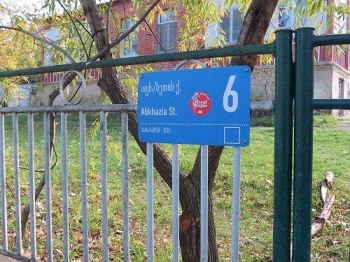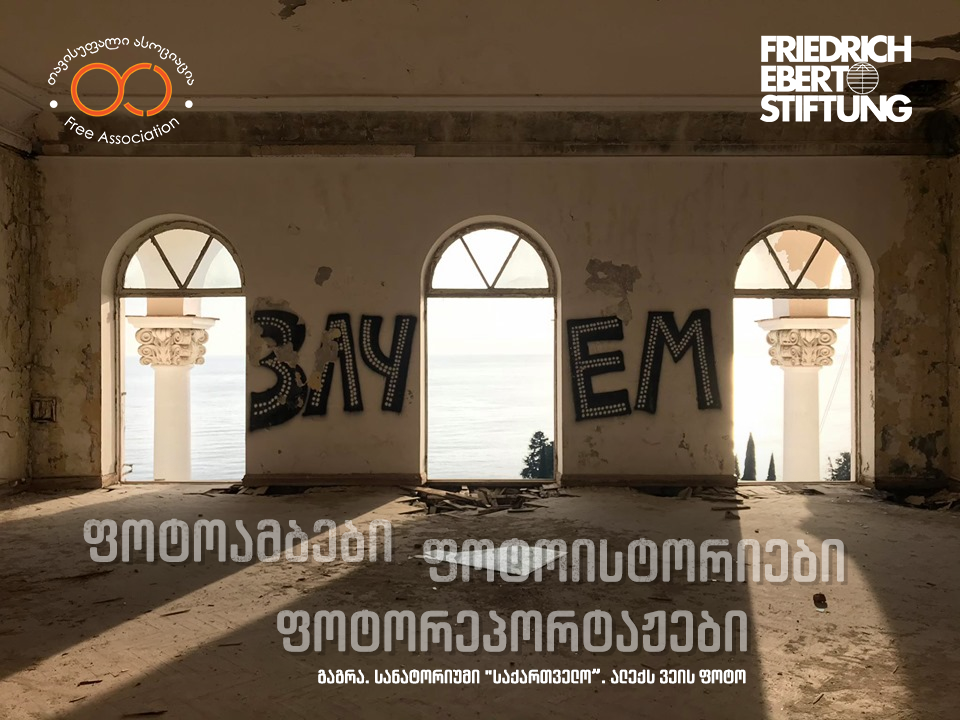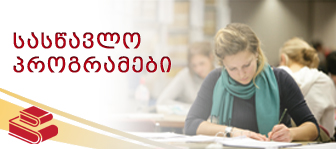წყნეთში მცხოვრებ დევნილებს აფხაზეთთან საკუთარი, მრავალწლიანი მოგონებები აკავშირებთ. ახალდაბის შესახვევში როგორც კი გადაუხვევთ, პირველი რაც შემოგეფეთებათ აბრაა წარწერით - აფხაზეთის ქუჩა, შემდეგ გზად აფხაზეთის შესახვევი, გაგრის ჩიხი და სოხუმის ქუჩა შემოგხვდებათ და ძალიან ბევრი ადამიანი, რომელთაც არც არაფერი დავიწყებიათ, მიუხედავად იმისა, რომ რამდენიმე ათეული წელი გავიდა.
For English scroll down ↓
მზია რეხვიაშვილი გულრიფშის რაიონში ცხოვრობდა და მოლარედ მუშაობდა. დღეს მისი სახლი აღარ დგას. შვილები ბოლო თვითმფრინავით გამოუშვა, თავად მეუღლესა და სიძესთან ერთად ბოლო გემს ვერ მიუსწრო და ქმრის ბიძაშვილის მანქანით სვანეთით წამოვიდა. გარკვეული ნივთების წამოღება უნდოდა, მაგრამ ვერაფერი გადმოიტანა, გარდა ორიოდე ქილა ლეღვის მურაბისა, რაც გზაში ძალიან გამოადგათ, შიმშილის გრძნობა დროებით რომ დაეკმაყოფილებინათ.
მზია გუდაუთაში დაიბადა. იქ მამის ორსართულიანი სახლი დღემდე დგას, აფხაზ მეზობელთან მეგობრობდნენ და წამოსვლამდე მამამ მას ჩააბარა. გამომშვიდობებისას მეზობელმა მზიას მამას წელზე დამაგრებული მცირე ზომის დანა უსახსოვრა. აფხაზებმა სოფლიდან ყველა ქართველი უვნებელი გამოიყვანეს, ავტობუსით ბომბორას აეროდრომზე მიიყვანეს, თვითმფრინავში ჩასვეს და გადმოიყვანეს.
"ურთიერთობები ხელოვნურად გაფუჭდა... დაძაბულობა 70-იანი წლებიდანვე შესამჩნევი იყო... ვიღაც ჩაერია, რაღაც მოხდა... რუსები იმ დროს თითქოს თავს არ იჩენდნენ, მაგრამ რა ხდებოდა ზემოთ, ეს ჩვენამდე არ მოდიოდა. სოფლამდე ცუდი ურთიერთობა არ მოვიდა, ეს ხდებოდა ქალაქში, ზოგიერთი დამოკიდებულებას გამოამჟღავნებდა ხოლმე... ვისთანაც ახლოს ვიყავით, არც არაფერს ამჟღავნებდა, არც არაფერს ამბობდა. აფხაზი დაქალები მყავდა, მაშინ კლუბი იყო, ერთად დავდიოდით,"-იხსენებს მზია.
ფოტოამბავი ↓

მამის სახლის ფოტო პანდემიამდე გამოუგზავნეს, მისთვის ჩუმად გადაიღეს. იქ თითქმის არაფერი შეცვლილა, ისევ ისეთი დგას სახლი, თითქმის ხელუხლებელი.
მურმან მირცხულავაც წყნეთში ცხოვრობს, მეზობლებთან ერთად ნარდის თამაშითა და მუსაიფით თავს იქცევს. გალის რაიონში ცხოვრობდა. საბუთი არ აქვს და ვერც გადადის: "სურვილი გვაქვს, რომ გვქონდეს კომუნიკაცია, გასვლა-გამოსვლა... რომ შეხვალ, შენს სახლს ხომ ნახავ, ესღა დაგვრჩენია საოცნებოდ..."
დევნილების ოცნებები ერთმანეთს ჰგავს, ყველას უნდა საკუთარი სახლისა და იმ ადგილების ნახვა, სადაც ცხოვრობდნენ. გია საბანაძეს პარკში შევხვდით, ჩაფიქრებული იდგა. გულრიფშის რაიონში, სოფელ მერხეულში ცხოვრობდა, სოხუმში კი სტომატოლოგიურ კლინიკაში მუშაობდა.
საშვიდობოს ისიც ჭუბერით გადმოვიდა.
"გადასარევი ცხოვრება გვქონდა, ყველას გვიყვარდა ერთმანეთი, ყველა ერთმანეთს ვიცნობდით. ცუდი დამოკიდებულება არც ჩვენ გვქონია აფხაზებთან და არც მათ ჩვენთან, სანამ რუსეთმა შუღლი არ ჩააგდო. შეიარაღებულ კონფლიქტამდე 2-3 წლით ადრე აფხაზები ემზადებოდნენ, ჯარი შექმნეს, შემდეგ აფხაზები და ქართველები ერთმანეთს დაუპირისპირდნენ, იარაღის გარეშე და იმ დროიდან ვითარება დაიძაბა. ამ ყველაფერს რუსი ახალისებდა, იარაღს ყიდულობდნენ. პოლიციიდან ყველა ქართველი გამოყარეს, რომ იარაღი არ ჰქონოდათ და მათი საიდუმლო ჩანაფიქრის შესახებ არაფერი სცოდნოდათ. შემოვიდა ქართული ჯარი წესრიგის დასამყარებლად... შემდეგ ყველგან "პოსტები" შექმნეს, ყველგან იარაღით იდგნენ. ქართველებს გასაქანს არ გვაძლევდნენ და ასე დაიწყო შეიარაღებული კონფლიქტი... აფხაზმა მეგობარმა მამა გადამირჩინა, ჯარის მეგობარი იყო. როცა სოხუმში შემოვიდნენ, პირველი რაც გააკეთა, ჩემს სახლში გამოიქცა, მეძებდა, რომ არაფერი დაეშავებინათ. მამაჩემი შეხვდა, ჩასვა მეორე დღეს ავტობუსში და ენგურის ხიდზე გადმოიყვანა... " - იხსენებს გია საბანაძე.
მას შემდეგ, სულ უნდოდა მადლობის გადახდა, სოციალურ ქსელებშიც ეძება, მაგრამ ვერ იპოვა.
"აფხაზეთში ისეთი პროპაგანდა მიდის, ახალგაზრდებს აზიზღებენ ჩვენს თავს. ურთიერთობა უნდა გავაღრმავოთ, ახალგაზრდები ჩამოვიყვანოთ, ვანახოთ, რომ მტრები არ ვართ".
ფოტოამბის არცერთ გმირს შეიარაღებული კონფლიქტის შემდეგ საკუთარი სახლი არ უნახავს.
Until this day, I knew Abkhazia only from television broadcasts dedicated to September 27 and from my friend's memories. Sometimes I imagined how on a summer morning we would run out of her house to the green yard, where the grass would wet our bare feet, then we would go down to the sea, cross the wooden bridge, would bask in the sun and listen to the sound of the sea...
The IDPs living in Tskneti have long-standing memories of Abkhazia. As soon as you turn into Akhaldaba lane, the first thing you will notice is a sign with the inscription – Abkhazia street, then on the way you meet Abkhazia lane, Gagra alley and Sokhumi street, and many people who remember everything, even though several decades have passed.
Mzia Rekhviashvili was a cashier when living in Gulripshi district. Today her house is no longer standing. She sent her children on the last plane, but she couldn't make it to the last ship with her husband and son-in-law, and left for Svaneti in her husband's cousin's car. She wanted to take some things with her, but could not carry anything, except a couple of jars of fig jam, which were very useful on the way, to temporarily satisfy the feeling of hunger.
Mzia was born in Gudauta. His father's two-story house is still standing there. Mzia`s family were friends with an Abkhaz neighbor, and before leaving, her father handed it over to him. While saying goodbye, the neighbor remembered Mzia's father with a small knife attached to his waist. The Abkhazians took all the Georgians out of the village unharmed, brought them to the Bombora airfield by bus, put them in a plane which took them away.
"Our relations were artificially spoiled... the tension was noticeable since the 70s... someone intervened, something happened... the Russians didn't seem to show themselves at that time, but what was happening on upper levels, it didn't reach us. Bad relations didn't reach the villages, it was in the city, sometimes shown by some attitudes... they, with who were close to didn't reveal anything. They didn't say anything. I had Abkhaz friends, then there was a club, we used to go together," Mzia recalls.
She received the photo of her father`s house before the pandemic. It was taken secretly specially for her. Almost nothing has changed there, the house still stands like in old times, almost unchanged.
Murman Mirtskhulava also lives in Tskhneti, playing backgammon with his neighbors. He lived in Gali district. He doesn't have a special document to travel there: "We want to have communication, to see each other... if you are there, you'll see your house, that's just a dream for us..."
The dreams of all IDPs' are similar. Everyone wants to see their home and the places where once they lived. We met Gia Sabanadze in the park, he was standing in thought. He lived in Merkheuli village in Gulripshi district, and worked in a dental clinic in Sukhumi.
He also left Abkhazia by crossing Tchuberi.
"We had a wonderful life, we all loved each other, we all knew each other. Neither we had a bad relationship with the Abkhazians, nor did they have a bad relationship with us, until Russia started this row. 2-3 years before the armed conflict, the Abkhazians were preparing, they created an army, then the Abkhazians and Georgians confronted each other without weapons, and from that time the situation became tense. The Russians were aware of all this, they were selling weapons. All Georgians were expelled from the police so that they did not have arms and did not know anything about their secret plans. The Georgian army came to restore order... Then they created "block posts" everywhere, everywhere with guns they stood. They didn't let us Georgians do anything and that's how the armed conflict started... An Abkhazian friend saved my father, he was a friend of the army. When they entered Sukhumi, the first thing he did was run to my house, he was looking for me to save me. My father met him, put him on a bus the next day and took him to Enguri. He took her over the bridge..." Gia Sabanadze recalls.
Since then, he wanted to say thank you all the time, looked for him it on social networks, but in vain.
"There is such a propaganda going on in Abkhazia that young people hate us. We need to deepen the relationship, bring young people here, we need to show them that we are not enemies."
None of the heroes of the photo story have seen their own home after the armed conflict.



















